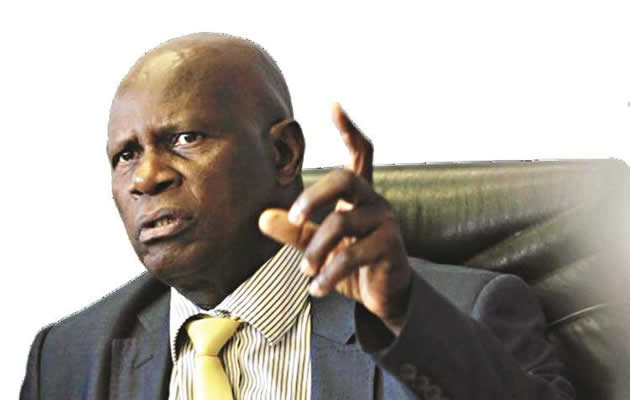Is the national budget all smoke and mirrors?

Lenox Lizwi Mhlanga
WE normally dread budget time, don’t we? Is it because there is little good news, if any, that comes out of such an exercise, which I have in the past described as “a lot of huffing and puffing,” with little or no plausible relief in times of economic hardship.
Yet this time around, the national budget that was announced with the usual pomp and ceremony on Thursday was different. The whole nation, it seems, hung on to every word that the Minister of Finance and Economic Affairs, Hon Patrick Chinamasa, uttered. It was a budget unveiled in a “New Dispensation,” of course!
So, things had to be different. At least we all hope it would be so. Forgive me for being sarcastic but with all the experience that I have garnered listening to statement after statement all these years, I must be understandably pessimistic.
I can’t help but feel pity for Minister Chinamasa, who in his trademark bombastic manner tries to draw excitement out of an occasion that can be at best, be compared to watching paint dry. He had the onerous task of trying to avoid breaking the hearts of an estimated 16 million people. Significantly more, if you include those in the diaspora.
Apart from the reality of having very little cash to play around with, Minister Chinamasa presented a budget statement whose principal challenge is whether the ordinary man in the street will be able to skim through all that verbiage and come out with bread and butter. There is just too much jargon in the national budget statement.
We made our voices heard about an unreadable constitution that was probably designed to confuse us. The only things to remember could be the amendments! But that is a story for another day.
I have always argued for a user-friendly budget, Honourable Minister, one that I can easily enlighten my 11-year-old Junior without being bombarded with too many “but whys”. One which we can “dot” all the i’s and cross the t’s. There is nothing more frustrating as trying to explain something so important in a medium one can hardly understand, in this case gobbledygook.
Perhaps it’s all intentional, or I am just plain dull or illiterate, which is not possible in Zimbabwe. Is it a case of what American comic and actor WC Fields once said; “If you can’t dazzle them with brilliance, baffle them with bull?”
It’s just like law and all its rigmarole, for a silly example, where one is forced to pay an arm and a leg in legal fees for a privileged few to unravel it for you. Information should not be the preserve of a few, particularly when it comes to the budget which affects the lives of so many.
One of the most puzzling events that precede the budget is an event called a ‘Pre-Budget Consultation’. It is a gathering of all the economic gurus that have been smoked out of their foxholes, the beleaguered Minister of Finance, parliamentarians and a few hangers-on, “to debate, dissect, and extrapolate” elements that will make up the budget document.
Correct me if I am wrong, judging by the time these costly road shows are held, I can bet you my bottom dollar that the budget would long been prepared. With my elementary understanding of English, I assume that the term “Pre-Budget” means “before the budget.”
Any government would not expect a budget, containing “vital info” on how a country can earn and spend its money, to be prepared in a couple of weeks! We might as well conclude that, bearing this glaring fact in mind in normal times, the national budget for the year 2017 would have long left the drawing board would be at the printers as the team gallivanted all over the country.
So why have national budget consultations to input into a document whose ink is already dry? Aren’t we putting the proverbial cart before the horse? By attending these charades weren’t we not lending credence to some form of mass deception? Not forgetting the money spent setting them up and sending the finance ministry juggernaut across Zimbabwe?
Why is it that, so few MPs attend such consultations? Are they showing contempt for an exercise that is so short on substance and long on hollow talk?
Talking about the one this fly on the wall managed to sneak into, some of the MPs who attended showed this flawed aspect of the whole process by giving suggestions which for all intents and purposes should have made it into the final document.
Are they telling us that they were absent from duty during debates in the House, which would not be surprising at all, or that if they were there, they could have been taking a nap which seems to have been parliamentary privilege for years?
The issues that were raised at the consultations, had some of our decision makers bothered to attended. Government overspending, a warped sense of priorities and the thorny issue of corruption and accountability dominated the discussions.
If we could substitute some big guns’ pockets for the treasury, I am sure that we would not be having all these problems. The question that remains lingering in the air like a bad smell is, do we have the courage to bite the bullet or are we going through the motions?
Our hope has always been that the national budget should recognise the fact that the country’s economy is far from having recovered. That is reality. And that people deserve some form of relief rather than to be thrown to the wolves, that are, Zimbabwe’s rapacious retail sector and banks.
It should have tamed the apparent disrespect for hard currency where businesses still believe in searing profit.
The pertinent question members of the public should be asking is whether the national budget is indeed an instrument in deception. Especially if a couple of months down the line, we seem to disregard the document and elect to operate like a village bottle store?
The budget in the new dispensation has made it so obvious that if we are able to salvage ourselves from the mess we are in, we should be honest and live within our means. There must be fiscal discipline where we stop spending what we do not have.
The challenge for leaders in the new dispensation is to ensure that the targets set in the national budget and the recommendations therein should lead us to a semblance of recovery. Our collective hope is that the 2018 national budget is not one of smoke and mirrors.












Comments